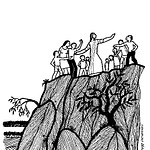God,
we admit we don’t always know how to follow you.
We’ve turned fasting into a performance,
a hunger strike for holiness,
a show we put on for anyone who might be watching.
We’ve worn the mask of piety so long
we’ve started to forget what our real face looks like.
But you didn’t ask us to act.
You asked us to trust.
Not to impress others.
Not to impress you.
Just enough hunger to remember we are not filled by this world.
Just enough honesty to admit we’ve been feasting on the wrong things.
So, give us the courage to drop the mask.
Help us stop performing like people desperate to be seen.
Help us start living like people who already are.
Give us the grace to fast with joy,
to pray without pretense,
to follow you without needing a spotlight.
Our Father sees in secret.
Your grace is enough.
And we’re just trying to live like that’s true.
Amen.
Matthew 6:16-18
Jesus said, “and whenever you fast, don’t look dismal like the hypocrites, for they love to disfigure their faces so as to show others they are fasting… But when you fast, put oil on your head and wash your face.”
You’ve got to love Jesus’s bluntness.
There’s no warmup here. No subtle invitation. No, “hey, let me affirm your effort.” Jesus cuts to the chase. Stop performing your piety before others and wash your face.
The word Jesus uses for hypocrite is worth pausing on. In Greek, it’s hypokrites,[i] a word borrowed from the theater. It means actor. In ancient Greek drama, actors wore exaggerated masks to play their roles. You weren’t yourself on stage. You were whoever the mask made you out to be. The mask smiled, cried, and shouted. It was the character.
So when Jesus says, “Don’t be like the hypocrites, like the actors,” he is saying, “Don’t play the part. Don’t put on the mask of holiness; don’t make fasting into a performance.”
Let’s be honest: We’re all a little bit theatrical when it comes to faith.
We want to be seen doing the right things. We want credit for the spiritual disciplines we sometimes squeeze into our overfilled schedules. We want people to know that we care, that we’re faithful, that we’re trying. Even our humility, if we are not careful, can turn into a kind of show. And Jesus isn’t impressed.
In Jesus’ day, fasting was a public and visible act. People wore sackcloths, smeared ashes on their foreheads, and walked around with long, pained expressions. You could hear their sighs from across the marketplace. It was a religious theatrical production, and everyone knew their lines.
Jesus says no more of that.
It is hard to say that we suffer for Jesus and, in the next breath, want credit. There’s a difference between faithful practice and spiritual performance. Jesus isn’t interested in our act.
We don’t fast to be seen. We fast to be formed, to be shaped.
Jesus says those who fast to be noticed have received their reward. In other words, congratulations, you got what you wanted; people noticed you. They might even admire you, but that’s it. That’s the whole reward. You’ve been seen, but you weren’t known by God. It’s like clapping at the end of Les Misérables at the Kennedy Center. The actors bow. The audience continues to clap. The curtain falls. And everyone goes home. Sure, the show was good, but nothing lasting happened.
Jesus isn’t calling us to impress. He’s calling us to intimacy, to be known by the Father who already sees.
Now, we cannot rush past the word fasting.
Some of us hear the word fasting and think that’s for monks, not Methodists. Or that’s only for Lent. Or I don’t do fasting; I do brunch.
Let’s be real. Most of us don’t fast because we often think we don’t need to. We live in a culture of constant consumption, not only of food but also of noise, entertainment, and options. We rarely consider intentionally going without something as essential and comforting as food, as the idea feels not just strange but offensive.
That discomfort says something.
It tells us fasting still holds a purpose, perhaps even a prophetic one.
Stanley Hauerwas writes that fasting is how we train our bodies to beg.[ii] Not because we’re trying to impress God, but because it teaches us how to trust God. Fasting says I’m not my appetite, I’m not my productivity, and I’m not my consumption.
Our resistance to fasting is often a symptom of a deeper problem: gluttony.
We don’t talk about gluttony anymore. It may not be flashy, but it is the sin that resides in our multiple refrigerators and pantries. Whether food, shopping, or streaming, we are addicted to more.
Jesus’s invitation to fasting is not a punishment. It is an invitation to freedom. Not because hunger makes you holy, but because it reminds us that only God can truly satisfy.
“When you fast, anoint your head and wash your face.”
No fanfare.
No altar candles.
Just wash your face.
It’s comically ordinary, but in a culture obsessed with appearance (now and then), it’s wildly subversive.
Jesus isn’t saying to fake joy. He’s just saying don’t fake sorrow, don’t dramatize your devotion, don’t weaponize your spiritual effort for applause. Just live it.
Don’t mishear Jesus. He isn’t telling us to hide our faith. There’s a difference between a hidden faith and a performative one. Jesus isn’t instructing us to be invisible; He is telling us to stop auditioning.
Some have spent so long trying to appear spiritual that we’ve forgotten how to be spiritual.
We’ve swapped out the mask of indifference for the mask of self-righteousness. We’ve dressed up our ego and religious clothing and called it faithfulness. That still is just a mask. And the father who sees in secret wants more than that.
And that is the reward: The Father sees in secret. Not the praise of people or the illusion of control. The quiet, sustaining truth that God already knows you and loves you anyway. That, friends, is grace.
No standing ovation is needed. The only reward comes from God, who sees the backstage.
That’s the invitation, the good news this morning:
Drop your mask.
Drop your mask of religious theatre, of spiritual superiority, of self-righteous hunger.
Drop the mask that says you have to have it all together, that hides the real you from the God who already knows you.
Wash your face.
Live like someone who doesn’t need to be seen because you are already seen by grace.
Amen.
[i] https://www.merriam-webster.com/dictionary/hypocrite
[ii] Hauerewas, Stanley. Matthew. Brazos Press.













